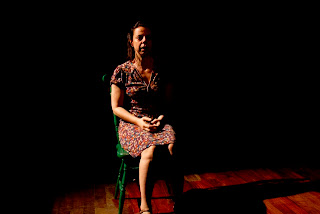OK, I’ve been waiting a long time to write this one. Santiago Loza is one of the more exciting writer voices I've come across here. He's very popular here-- popular like, I delayed writing this because I'd seen three of his plays but there was a fourth up that I wanted to see before writing. I’d missed a fifth that closed befre I could see it, and I just noticed a sixth has opened. Which will not be reflected in this post. There is a limit after all.
 |
| Nada del amor me produce envidia: the revival |
I may have made this side note already, but I may as well make it again: this multi-play thing isn’t quite as weird as it seems because 1) Plays on the “off” circuit can run a long time, like years, because they usually go one night a week. The upside of this system is clear, the downside is that set and lights are forced to be simple (or maybe that’s another upside because the focus goes back to, ahem, the writing and acting?) 2) In the “off” world at least, plays here are verrry short, so, you know, you can write more of them. (There is one delightfully logarrheic playwright-exception to this rule, I’ll get to him in a later post.) Under an hour is not uncommon, without there being any feeling that the play is a “one act” that needs to be paired with something else. In some ways I like this— theatre is easy to go to here, a quick fun thing to do with some friends after cocktails and before dinner. Occasionally, though, I do feel like there’s more play to be written on a given premise or character/s than we’ve been given, and I want the playwright to have not just stopped before the structure became too troublesome. And I have wondered, if one were to try to import one or more Argy plays to the US, how much of a deal-breaker the shortness would be.
 |
| Nada del amor... the original. Didn't see it. Looks a little cheesy, right? |
OK back to Loza. It’s not that his plays are innovative in form or anything. From what I’ve seen he’s at his most comfortable writing monologues, and the first three plays I saw (in order: Nada del amor me produce envidia, Todo verde, and La mujer puerca) were in some ways so similar as to be predictable: a 50-minute monologue spoken by a woman to whom life has been somehow unfriendly. But also happily predictable was the way in which these characters' different voices were unusual, strange and beautiful and very very funny in the moment-to-moment writing, the pleasure of constant small surprises in the ways they think and process their odd experience of the world.
 |
| Todo verde |
A third part of what allows Loza to be so prolific is that he’s an exception to the almost-rule of Argentine theatre originators being director/writers who do a certain amount of their text development in the rehearsal room with the actors. Loza writes and then hands over the text to the director, north-american style. So his plays have also afforded me an interesting way to see different directors respond to similar texts. Todo verde (“Everything green”) was directed by an actor, so (I hate to say predictably) the acting was good but staging unremarkable. La mujer puerca (“The pig woman,” terrible title, at least in English,) was directed by the little Teatro Elefante’s AD, also a graphic designer (also an actor), so it was very chic as well as fabulously acted. Nada del amor me produce envidia (“Nothing about love makes me envious”) was an interesting case.
 |
| La mujer puerca (she was fabulous) |
I’m becoming aware that there’s not much meat on those descriptions. Sorry. What are the dang plays about? I have to say I’m having a hard time summarizing. Not because they'd be hard to summarize but the opposite: the charm of Loza's work is all granular, and when I picture a broad-strokes synopsis that couldn't capture those details it just seems like it would diminish the whole. So my apologies for the mystery, please take my word for now.
This still leaves the fourth Loza play to talk about: Mal de montaña (maybe because I just got back from a mountanous Peru trek I’m going to offer up “Altitude Sickness” as a translation). But this post is already long enough, and I can usefully start another one on this note…
No comments:
Post a Comment